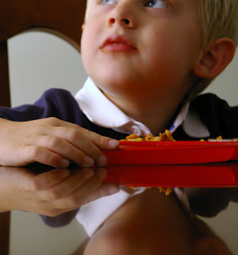Did you know that Truthout is a nonprofit and independently funded by readers like you? If you value what we do, please support our work with a donation.
Congress is gearing up to cut food stamp benefits in order to fund a new child nutrition bill—a move that Joel Berg, executive director of the New York City Coalition Against Hunger, called “cutting the budget from kids at home to pay for kids in school.” In an interview with The Washington Independent earlier this week, Berg described how hard the cuts are going to affect low-income families. TWI’s Anne Lowrey writes:
The cliff in food stamps means that one month, a family will receive a set amount of money, about $4.50 per person per day. The next month, they will get less. In his week eating according to the SNAP budget, Berg shopped for the first three days as if he received full benefits. For the second two, he shopped as if he received cut benefits. The result? Less food, or less healthy food.
But progressives from the First Lady to the Center for Science in the Public Interest are standing behind the cuts because they’ll help pay for a child nutrition bill. Though they argue the reduction to food stamp benefits isn’t really a cut, the removal of a temporary 2009 boost from the stimulus bill to those benefits to pre-empt rises in food costs that never ended up being an issue, Berg sees it otherwise:
That claim is really preposterous and offensive. The Center for Science in the Public interest, they’re progressive, but they have put that idea forward. If they had a cost of living increase and wage increases over five years, but then we returned them to the salary that they had five years ago, my guess is that they would see that as a cut, rather than a return to the baseline.
I caught up with Berg and asked why he thinks Congress wants to make these cuts now, when so many people are unemployed and depend on food stamps, and what can be done to oppose it.
“They’re good people with good intentions who do good work,” Berg says of the people pushing for the child nutrition bill at the expense of food stamps. “I just don’t think they really speak to or deal with enough low-income people to understand what this is going to mean in their lives.”
Click here to sign up for Truthout’s FREE daily email updates.
According to Berg, there’s a lack of understanding for the connection between hunger and obesity. When people have so little to stretch on food, what’s filling will take precedence over what’s healthy. Especially with the proposed cuts, there’s practically no money to spend on fruits and vegetables after filling staples like pasta and meat.
According to a February 2010 fact sheet from the Food Research and Action Center (PDF), a number of factors about living in poverty can contribute to obesity, including constant stress, cycles of going hungry and overeating to compensate, the lack of fresh foods in low-income neighborhoods, the kind of marketing they’re exposed to, and fewer opportunities to exercise or access basic health care services. The Center also says, “By improving dietary intake and reducing food insecurity, participation in the federal nutrition programs plays a critical role in obesity prevention.”
That argument might make the child nutrition bill seem like a great thing, if it weren’t coming at the expense of the other meals in the day. It’s hard to argue that kids aren’t affected by what happens to food stamps. The Associated Press reported last year that a peer-reviewed study published in the Archives of Pediatrics and Adolescent Medicine estimated that “nearly half of all U.S. children and 90 percent of black youngsters will be on food stamps at some point during childhood.”Berg estimates that school lunches make up 16 percent of children’s meals, leaving their overall diets compromised after the cuts to food stamps.
And as vital as food is, the cuts stand to have farther-ranging implications on other spheres of life for families on food stamps. Creating hungrier families will undermine so many of the White House’s other goals.
“The kids who have less food available are going to do less well in school,” Berg says—which is totally counterintuitive to the Obamas’ goal of improving U.S. schools with the “race to the top” campaign. “And if you want people to get back to work, there’s no question that improving food security contributes to worker productivity.” Ensuring that families have enough to eat would also reduce overall U.S. healthcare costs.
Ultimately, Berg stressed, the child nutrition bill is a good one, and should be passed. He pointed out that there are so many things the government could cut right now, but at a time when unemployment is high and low-income families are seriously hurting, undermining one hunger relief program in favor of another seems like a bad idea.
Braden Goyette is a staff writer for Campus Progress.
Media that fights fascism
Truthout is funded almost entirely by readers — that’s why we can speak truth to power and cut against the mainstream narrative. But independent journalists at Truthout face mounting political repression under Trump.
We rely on your support to survive McCarthyist censorship. Please make a tax-deductible one-time or monthly donation.
